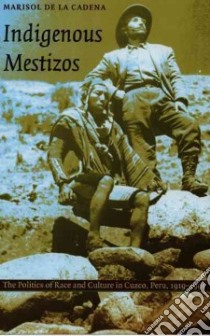Indigenous Mestizos - 9780822324201
Un libro in lingua di Cadena Marisol De LA, Mignolo Walter D. (EDT), Silverblatt Irene (EDT), Sald & iacute var-hull Sonia (EDT) edito da Duke Univ Pr, 2000
- € 28.40
- Il prezzo è variabile in funzione del cambio della valuta d’origine
De la Cadena’s ethnographically and historically rich study examines how indigenous citizens of the city of Cuzco have been conceived by others as well as how they have viewed themselves and places these conceptions within the struggle for political identity and representation. Demonstrating that the terms Indian and mestizo are complex, ambivalent, and influenced by social, legal, and political changes, she provides close readings of everyday concepts such as marketplace identity, religious ritual, grassroots dance, and popular culture, as well as of such common terms as respect, decency, and education. She shows how Indian has come to mean an indigenous person without economic and educational means—one who is illiterate, impoverished, and rural. Mestizo, on the other hand, has come to refer to an urban, usually literate, and economically successful person claiming indigenous heritage and participating in indigenous cultural practices. De la Cadena argues that this version of de-Indianization—which, rather than assimilation, is a complex political negotiation for a dignified identity—does not cancel the economic and political equalities of racism in Peru, although it has made room for some people to reclaim a decolonized Andean cultural heritage.
This highly original synthesis of diverse theoretical arguments brought to bear on a series of case studies will be of interest to scholars of cultural anthropology, postcolonialism, race and ethnicity, gender studies, and history, in addition to Latin Americanists.
Informazioni bibliografiche
- Titolo del Libro in lingua: Indigenous Mestizos
- Sottotitolo: The Politics of Race and Culture in Cuzco, Peru, 1919-1991
- Lingua: English
- Autori : Cadena Marisol De LA, Mignolo Walter D. (EDT), Silverblatt Irene (EDT), Sald & iacute var-hull Sonia (EDT)
- Editore: Duke Univ Pr
- Collana: Duke Univ Pr (Paperback)
- Data di Pubblicazione: 01 Maggio '00
- Genere: SOCIAL SCIENCE
- Argomenti : Mestizos Peru Cuzco Social conditions Indians of South America Mixed descent Peru Cuzco Racism Peru Cuzco
- Pagine: 408
- Dimensioni mm: 241 x 158 x 31
- ISBN-10: 0822324202
- EAN-13: 9780822324201


